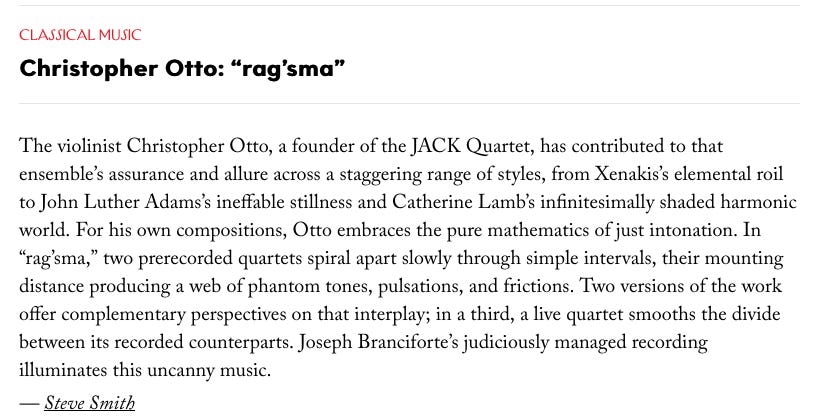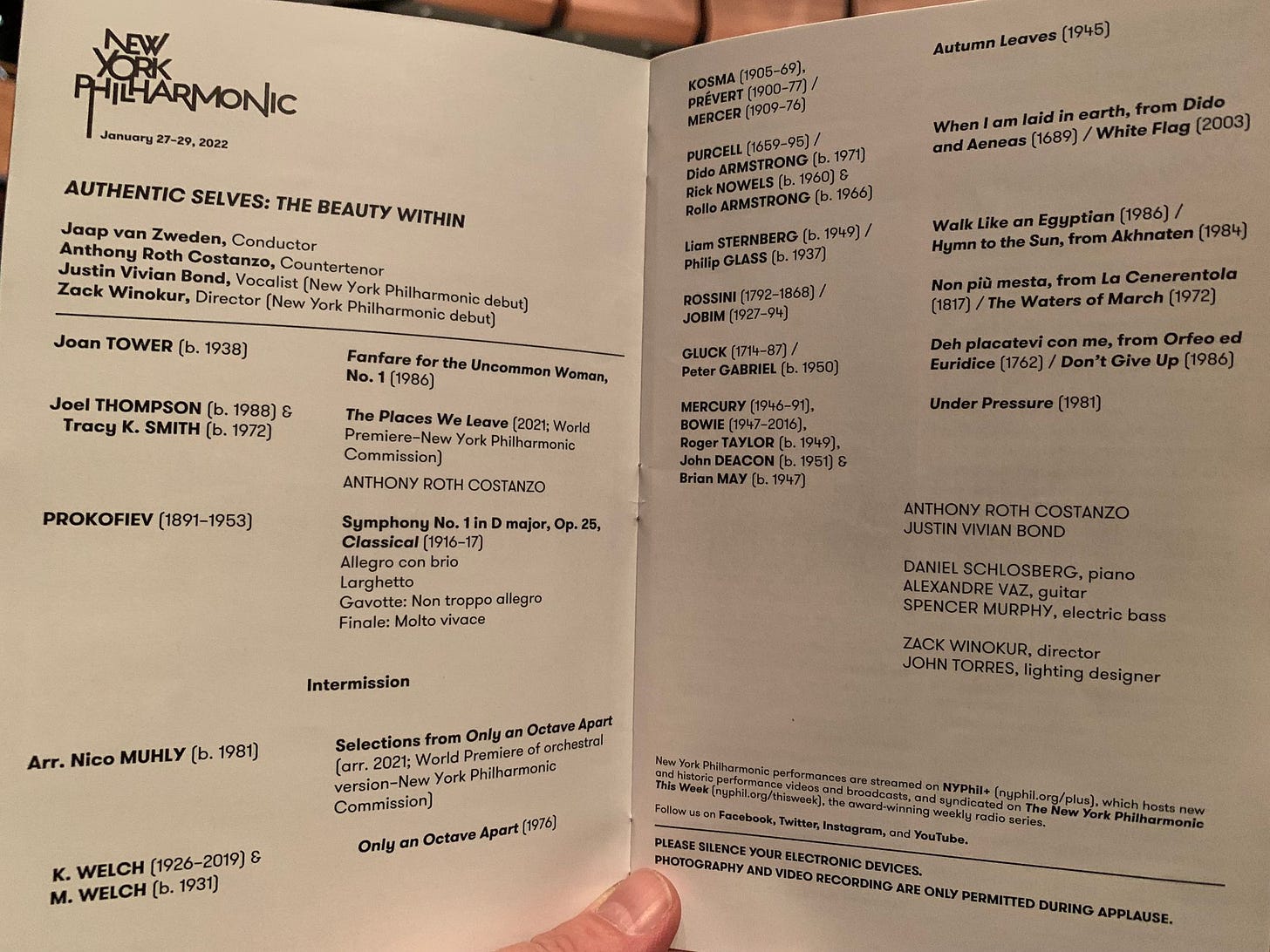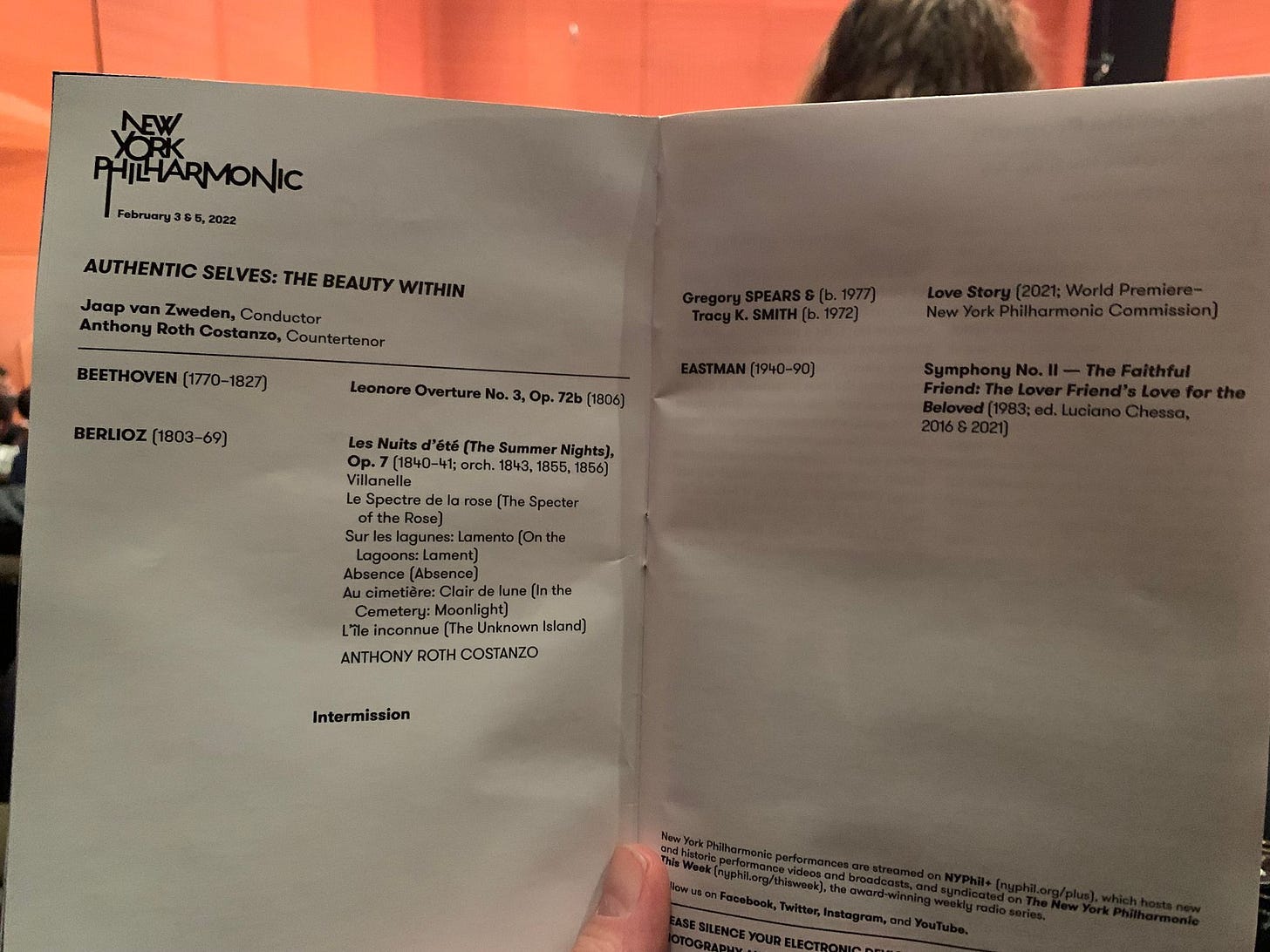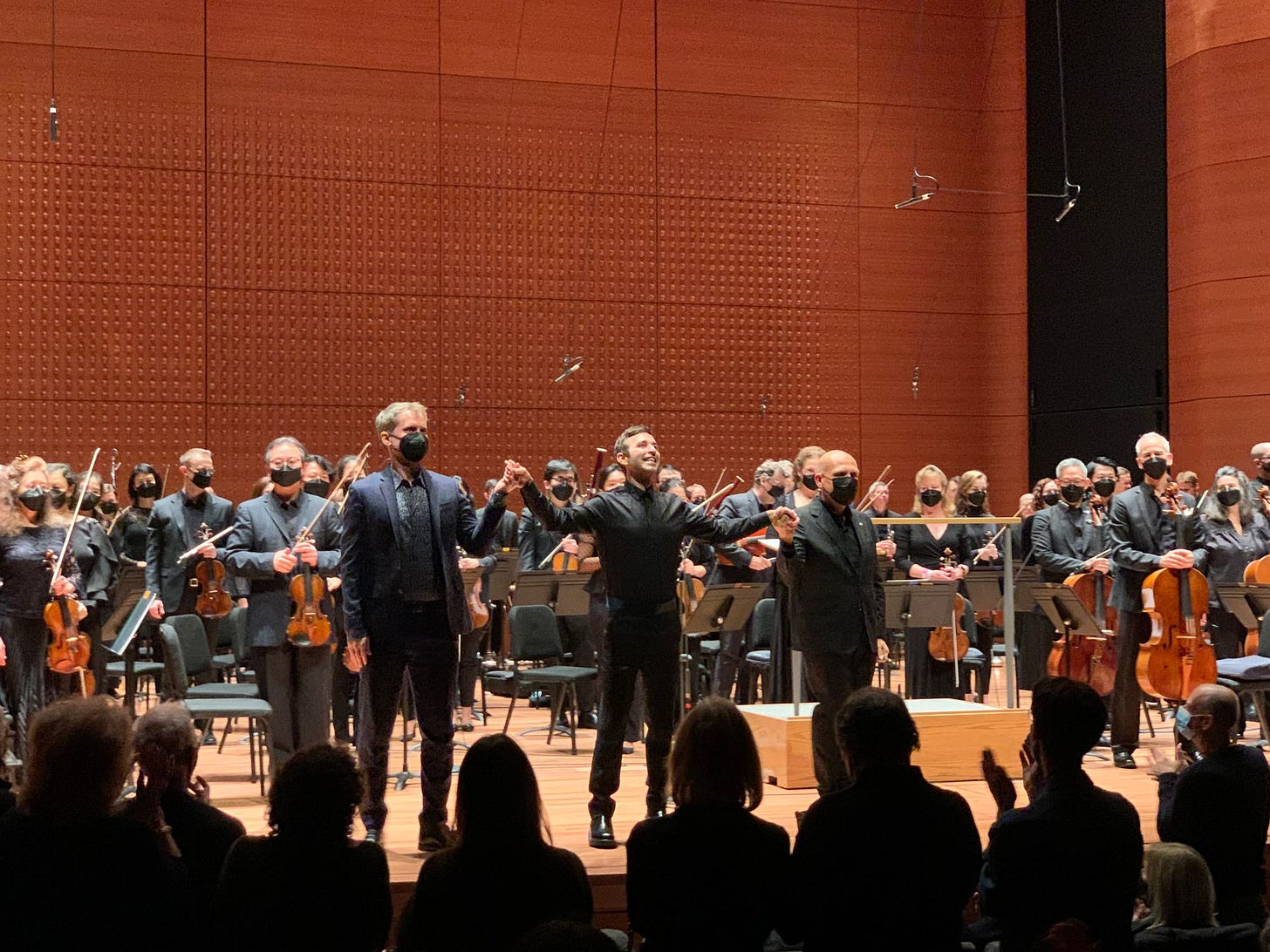Transition transmission.
Picking up where we left off: departures, arrivals, and suggested live events for the week ahead.
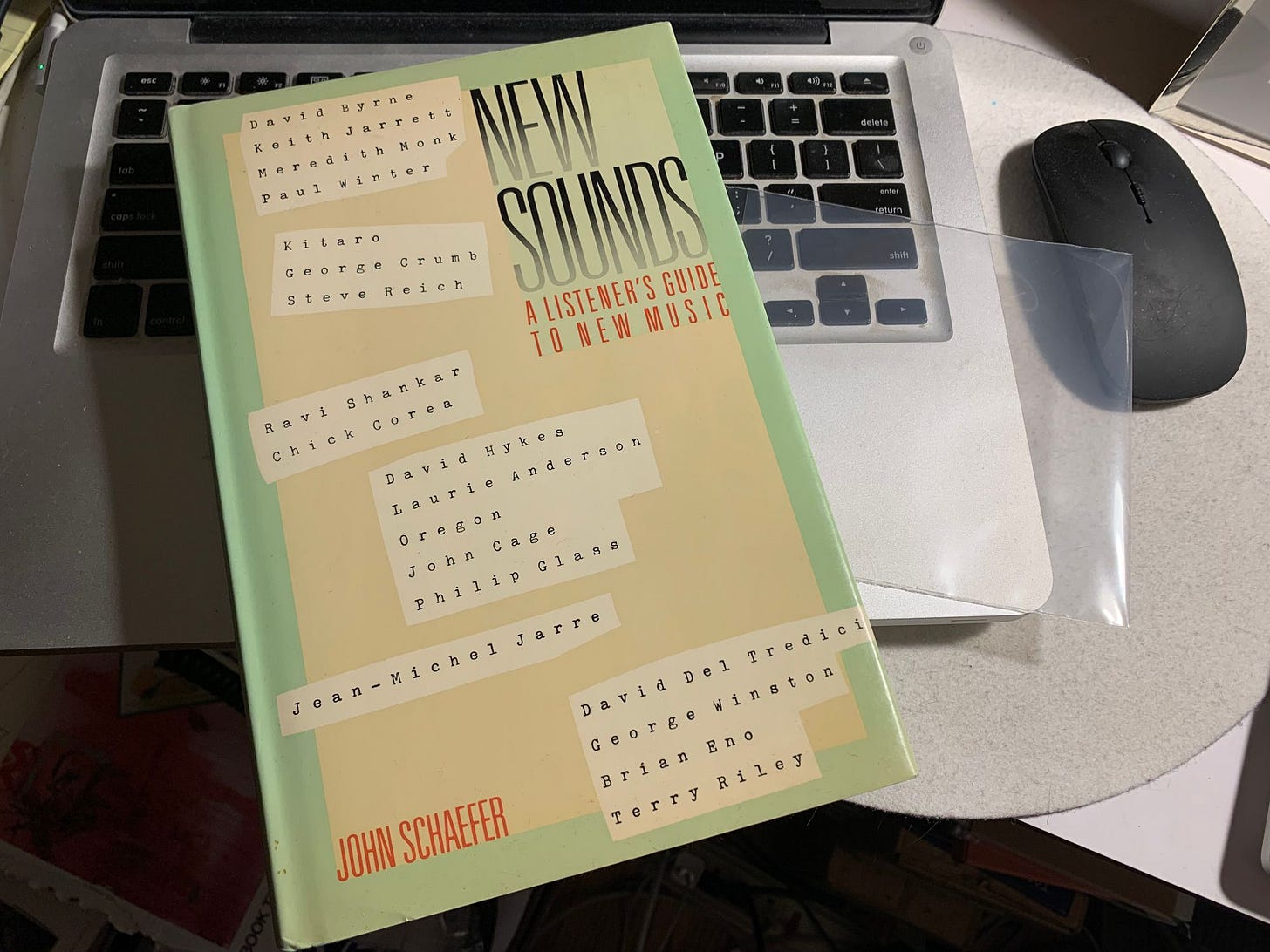
A month has passed since the last newsletter. To say that a lot has happened in the meantime is a laughable understatement.
On January 14 I left NPR, just over a full year after I started there. I'm proud of the work I accomplished while I was with the Arts, Culture & Books Desk – Culture Desk for short, now – and grateful to everyone I worked with for 12-plus months of patience, generosity, and friendship—I'm counting on that last bit to endure.
Here's a portion of the farewell memo I sent out on my last day:
When I first came to NPR for a three-month temp engagement – just over a year ago, as it happens – my most recent experience editing for radio had involved razor blades and sticky tape. (Ned Wharton would have been impressed.) Arriving at a time of tumultuous transition, I had the privilege of working with, learning from, and coming to admire deeply and profoundly the dazzlingly creative team that constitutes what’s now called the Culture Desk. I built bonds that will last a lifetime—and loved and lost an extraordinary colleague whose spirit and generosity will be a part of me forever.
I am forever grateful to Anastasia Tsioulcas for envisioning and enabling this opportunity, and to the many people who helped me to find my way and make a contribution.
My story on @c4trio today on @NPRWeekend edited by @nightafternight Thank you Steve! https://t.co/hdfyZ7v4BV
— Betto Arcos (@ArcosBetto) January 22, 2022
Incidentally, I reported on Twitter that a story by Betto Arcos about Venezuela's C4 Trio, which aired on January 22, was "my last (for now!) NPR contribution." But that actually isn't accurate: One more story I edited, a Tom Huizenga review of Eden, the forthcoming release by Joyce DiDonato, will air on or close to the album's street date, February 25, on All Things Considered.
While I'm on the subject of last things, my final contribution to the Goings On About Town section of The New Yorker appeared in the January 24 issue. Out of concern for omicron-related uncertainty, postponements, and cancellations, editor Sheldon Pearce asked me and my colleague Oussama Zahr to cover noteworthy recordings we'd missed writing about when they were new.
I selected rag'sma, the first recording devoted to the arresting music of violinist Christopher Otto, a founding member of JACK Quartet.
The recording is available from the greyfade label on vinyl and in digital formats. (As of now, only six copies of the LP remain—just saying.)
Having closed the book on an enjoyable and fruitful collaboration with The New Yorker, I have to thank Russell Platt, the longtime classical-music listings editor who brought me in initially. Russell's successors – first Fergus McIntosh, then Briana Younger, and finally Sheldon – were patient, perceptive editors and talented writers, one and all. Thanks, too, to Goings On About Town editor Shauna Lyon, newyorker.com culture editor Michael Agger, and staff writer Michael Schulman (wearing his Goings On About Town theatre editor hat) for unfailingly generous interactions.
Oussama was a brilliant co-conspirator and, briefly, an excellent supervising editor himself. That we complemented each other extremely well, in terms of tastes and inclinations, was the special sauce during our entire run together. Last but not least – and certainly not for the first or last time – my abundant gratitude to Alex Ross, a brilliant, consistently engaging writer, and the most gracious, encouraging colleague I've ever had the privilege of knowing.
On January 24, as you likely know already, I started a new position as Culture & Arts Editor at New York Public Radio, overseeing coverage for WNYC radio and the Gothamist website. The professional bio included in the NYPR press release is succinct and factual. But here, among friends, I want to share my original draft, which includes a few details omitted in the circulated version:
Steve Smith will be joining us as the Culture & Art Editor. Steve is coming to WNYC from NPR, where he was a senior editor on the Arts, Culture and Books desk. Born in Georgia and raised in Texas, Steve first realized he actually was a New Yorker while enrolled in college in San Antonio. After five years as a program host at a Houston classical radio station, he packed up his belongings (including a hardcover copy of John Schaefer’s book New Sounds), drove to Long Island, and grew acquainted with WNYC during twice-daily hour-long commutes. Steve spent 13 years as a music editor at Time Out New York, for more than half that time doubling as a classical music critic for The New York Times. He joined the Boston Globe as an assistant arts editor, covering museums and galleries in addition to music, then came home to New York City to establish National Sawdust Log, a digital arts publication embedded within the Williamsburg concert venue and arts incubator National Sawdust. He lives in Jackson Heights, Queens, with his wife, journalist and scholar Lara Pellegrinelli, and their daughter. Steve’s first day is January 24.
I've been sprinting breathlessly to get up to speed at NYPR, learning unfamiliar tools and systems, and getting to know new colleagues. I've also had a brief Zoom klatch with some of my new colleagues at WQXR: the aforementioned John Schaefer, whose inestimable impact on my musical education started even before I moved to New York City, and chief content officer Ed Yim, who I'd interviewed in his previous role as president of the American Composers Orchestra, along with faces corresponding to names and voices familiar in the Pellegrinelli-Smith household… Elliott Forrest, Jeff Spurgeon, Paul Cavalconte, Nimet Habachy, and more. Everyone is eager to see what can be made of this opportunity.
My first substantial collaboration with Jennifer Vanasco, my predecessor as WNYC arts editor and a terrific multimedia reporter, covers a provocative and fascinating exhibition now on view at Museum of Moving Image in Astoria, which establishes a historical context for the AI-assisted deepfake videos proliferating now online. It's the start of a beautiful relationship, but, alas, the end of our local collaboration, as Jennifer is leaving WNYC… for NPR, where she's just been named the newest editor on the Culture Desk. (The world, it is very small.)
My first substantial collaboration with my other new culture & arts associate, longtime Gothamist editor Ben Yakas, is a delightful round-up of reader opinions regarding New York City's best and worst dog runs, begun in collaboration with another editor. I look forward to digging deeper with Ben in weeks to come.
And yes, if the question crossed your mind, we will be hiring a new culture and arts reporter. Stay tuned.
Concertgoing life has resumed, gradually and cautiously, with two outings to hear the New York Philharmonic. Both concerts featured the talented and charismatic countertenor Anthony Roth Costanzo, an invaluable partner to the Phil during its long months of panic-prompted shutdown, and presently the orchestra's artist-in-residence. With the orchestra open for business again, Costanzo provided two of the most delicious programs I never anticipated from any mainstream institution, let alone one of the nation's most venerable symphony orchestras.
Each of the concert programs included in Costanzo's spotlight celebration, Authentic Selves: The Beauty Within, included the world premiere of a newly commissioned work setting text by former U.S. poet laureate Tracy K. Smith, as well as an unconventional finale. The first, which I caught on January 28 in Frederick P. Rose Hall, featured a gorgeous composition by Joel Thompson, The Places We Leave, and a selection of songs from Only an Octave Apart, the proudly queer revue Costanzo assembled with NYC cabaret icon Justin Vivian Bond.
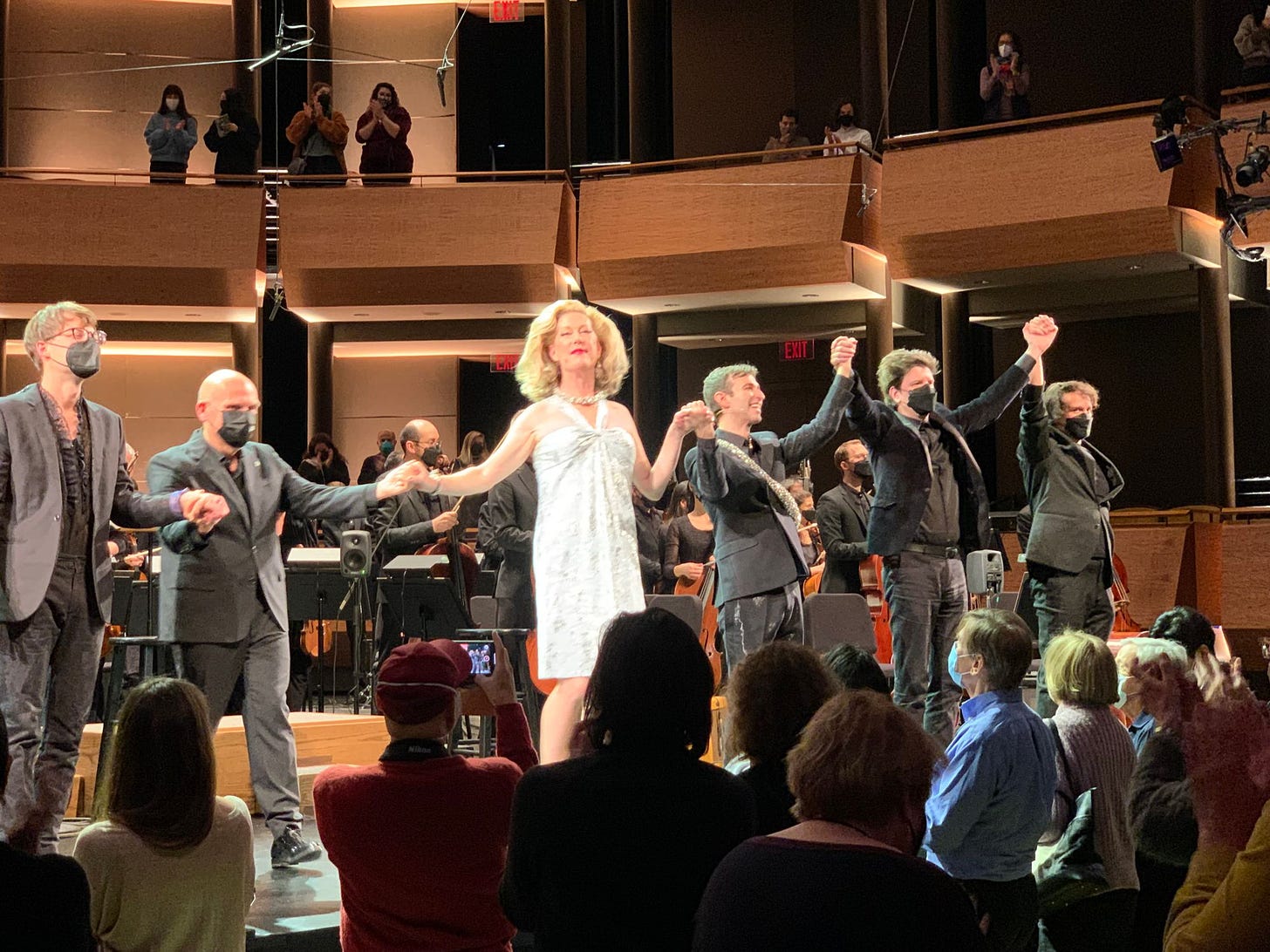
An account of the event by Zachary Woolfe in The New York Times hits all the right notes, He even takes a more charitable view of the inclusion of Sergei Prokofiev's perky Symphony No. 1 ("Classical") than I had; I judged its presence a misstep, space that could have been better filled with some similarly lean, athletic American piece… something like Aaron Copland's Short Symphony, maybe?
Zack's description of how the original 90-minute revue was compacted into an economical 50 minutes is especially useful for those of us who missed the run at St. Ann's, and he aptly cites Nico Muhly's luxe, shimmering orchestrations, which Jaap van Zweden and the Phil players handled beautifully. (An album whose contents corresponded to the Phil presentation had arrived that very day.)
That these two charismatic performers could pull off their Carol Burnett and Beverly Sills homage with tuneful flair was never in question. Still, I wasn't prepared for how genuinely moved I felt by an unlikely mash-up of Dido's Lament, by Henry Purcell, and "White Flag," as sung by Dido, nor how gutted I could be by this odd couple's rendition of "Don't Give Up," with Bond playing Kate Bush to Constanzo's Peter Gabriel—just days after Bridget Everett and Jeff Hiller messed me up with the same song in the pilot episode of Somebody Somewhere.
The second program, which I heard at Alice Tully Hall on February 3, opened with canon fodder: a sturdy account of Ludwig van Beethoven's Leonore Overture No. 3, and a daring, sensitive traversal by Costanzo of Hector Berlioz's Les nuits d'été, a lovely piece handled more often by mezzo sopranos, by a composer whose charms mostly elude me. (Sorry, don't @ me.)
The highlights came with the second half. Love Story, a beautifully bittersweet premiere from Gregory Spears (best known for his operas Paul's Case and Fellow Travelers), turns a brief Smith poem round and round again, examining its ideas and sentiments from a succession of emotional perspectives.
Julius Eastman's Symphony No. 2 – rediscovered by Mary Jane Leach and edited by Luciano Chessa – is a quixotic, quietly ecstatic roil for an orchestra that includes three apiece of bass and contrabass clarinets, bassoons, contrabassoons, trombones, and tubas, and six timpani. Despite all that equipment, the work is never bombastic or histrionic; here again Zack Woolfe's Times review is sharp and evocative.
This reconstructed symphony's world premiere – presented in this same hall in 2018 by the Mannes Orchestra, with Chessa conducting – conveyed enthusiasm, commitment, and the electric buzz of discovery. But here, played for the first time by professionals, the music had overpowering presence and potency. Extravagant instrumentation notwithstanding, this work deserves to be presented widely.
There was more to Constanzo's wide-ranging residency, too, including a thoughtful panel presentation by National Black Theatre at the intimate Kaplan Penthouse, which I couldn't attend and dearly wish had been streamed.
Concerts like these aren't threatening to become standard operating procedure at the New York Philharmonic. But neither are bold ventures and progressive ideas altogether rare; programming in recent seasons has showed a well-judged mix of daring propositions, offbeat repertoire, and thrice-familiar classics. This weekend's concerts, in which Yuja Wang's star power presents an opportunity to sneak in Zoltán Kodály’s Concerto for Orchestra and Bohuslav Martinů’s Symphony No. 1, comes from the second column; next week's pairing of Richard Strauss songs and Piotr Tchaikovsky's Symphony No. 5 represents the last category, though it does include the U.S. premiere of Žibuoklė Martinaitytė's wonderful Saudade.
Still, considering everything, Costanzo's programs were rare, refreshing treats well worth venturing out to experience. And it's always gratifying to see ventures like these draw large, diverse, and vociferous crowds.
Night After Night Watch
Concerts listed in Eastern Standard Time. Please check in before heading out.
Philadelphia Orchestra
Isaac Stern Auditorium, Carnegie Hall
Tuesday, Feb. 8 at 8pm; $21–$128
Yannick Nézet-Séguin conducts the New York premiere of two recent pieces: a suite from Matthew Aucoin's opera Eurydice, and Valerie Coleman's This Is Not a Small Voice. The latter features soprano Angel Blue, who also performs in Samuel Barber's Knoxville: Summer of 1915. Florence Price's Symphony No 1, recorded recently and eloquently by this orchestra and conductor, completes a program Peter Dobrin praised effusively in his Philadelphia Inquirer review (paywalled).
Cleek Schrey and Weston Olencki
Roulette, Brooklyn
Thursday, Feb. 10 at 8pm; $25, advance $20
Free livestream (donations encouraged)
Fiddler (mostly) Cleek Schrey and trombonist (mostly) Weston Olencki, both intrepid explorers of physical sound production, arcane apparatuses, and immersive resonance, pair up for an evening of old and new music for pump organs from the turn of the 20th century, with and without electronics.
Ethan Iverson
Roulette, Brooklyn
Friday, Feb. 11 at 8pm; $25, advance $20
Free livestream (donations encouraged)
Pianist and composer Ethan Iverson, a founder of The Bad Plus engaged most recently in a steady stream of recorded encounters with redoubtable masters, celebrates his Blue Note label debut, Every Note Is True. Joined by bassist Larry Grenadier and drummer Nasheet Waits, he'll play material from the album; members of the New England Conservatory Jazz Orchestra will join in for the New York premiere of Ritornello, a 45-minute through-composed Iverson original.
Flying Lotus
Isaac Stern Auditorium, Carnegie Hall
Saturday, Feb.12 at 8pm; $12.50–$55
The trailblazing producer, rapper, recording impresario, and scene catalyst Flying Lotus lands in the big room at Carnegie Hall, appearing as a headliner in the institution's ambitious citywide Afrofuturism festival. Sharing the bill are Miguel Atwood-Ferguson, a versatile multi-instrumentalist, arranger, and composer, and improvising harpist Brandee Younger, whose presence warrants the seemingly obligatory reminder that FlyLo's great aunt was the sublime Alice Coltrane.
yMusic
Joe's Pub at the Public Theatre
Sunday, Feb.13 at 7pm; $20
The house band of the indie-classical revolution, the smart, stylish sextet yMusic is equally at home on a concert-hall platform playing tony premieres, a nightclub bandstand surrounding savvy songsmiths like Ben Folds and Bruce Hornsby, or an arena stage pop icon Paul Simon. Appearing under the aegis of Laurie Anderson's Vanguard Residency (which BTW does not ensure her presence, just so you know), the group plays the in-person premiere of Together, a terrific new piece by Judd Greenstein that in itself is cause to celebrate.
PRISM Quartet
Roulette, Brooklyn
Monday, Feb. 14 at 8pm; $25, advance $20
PRISM, a long-running saxophone quartet with a boundless appetite for innovation, at last mounts the New York premiere of an especially venturesome undertaking: Mending Wall, a fully staged concert directed by Jorinde Keesmaat, who says the show's themes of barriers, division, and isolation have grown more resonant during its pandemic-prompted delay. Music by Martin Bresnick, George Lewis, Juri Seo, and Arturo O’Farrill finds inspiration in poems of Robert Frost, Keorapetse Kgositsile, Waly Salomão, and Guillermo Gómez-Peña; pianist O'Farrill and soprano Tony Arnold are featured guests.



